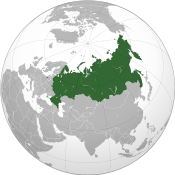Putin signs law increasing fines for illegal protestors
Friday, June 8, 2012
President Vladimir Putin of Russia today signed a new law increasing the fines available against those involved in unlawful protests, overriding concerns from his human rights advisor and the Council of Europe.

The measure was proposed by ruling United Russia after May 7 protests coinciding with Putin's third inauguration saw clashes between protestors and police, with 400 arrests. The United Russia-dominated State Duma voted 241–147 in favour earlier this week, ahead of a protest scheduled for Russia Day, June 12, in Moscow against Putin's twelve-year rule.
The new legislation increases maximum fines for individuals involved in illegal protests from 100 rubles (US$3) to 10,000 rubles (US$300), but those breaching "the established rules of conduct" face fines of up to 20,000 rubles, up from a previous high of 1,000 rubles. Officials caught engaging in illegal demonstrations have had their maximum penalty increased from 50,000 to 600,000 rubles (upper equivalent: US$20,000).
Organisers of protests that result in injury or damage can be fined up to 300,000 rubles. Smaller violations can be dealt with by detention of up to fifteen days, and up to 200 hours of community service is available as an alternative sentence to a fine. Protestors are banned from concealing their faces and nobody with a criminal record may organise a protest.
Supporters say the bill is required for public safety. Putin explained protests "must be organized in such way that they inflict no damages to other citizens, who do not take part in them" and insisted authorities "should apply the new law in such a way that it does not limit the citizens’ right for expression over any issue of internal or external politics, including street marches, events and rallies".
Dmitry Peskov, Putin's spokesperson, said the law would be published in Saturday's edition of the Rossiyskaya Gazeta; it takes effect instantly upon publication. He said the law matched similar legislation in other European nations. Irina Yarovaya, who leads the State Duma's Security and Anti-Corruption Committee, agreed that health and safety was the law's top priority.

Yarovaya noted the 'youth' of democracy in Russia, saying "We are only beginning to have the experience that other countries have been accumulating for decades and centuries." She said Putin's "political mission" is "protection of public security and national interests of the country".
Putin says he investigated the laws of European Union members, and found "There is nothing in our law which would have been more tough than similar legislation in the countries I named," which included Germany, France, Spain, and the United Kingdom. He today spoke of last year's "mass riots, torched cars and robbed stores" in the UK.
The law has faced local and international criticism. Mikhail Fedotov, chairman of the Presidential Human Rights Council, urged Putin to veto the law and said much depended on enforcement, which he hoped to be "moderate". The Council claims it breaches existing legislation including the constitution.

| A society which permits rallies and marches must protect itself from radicalism | ||
—Vladimir Putin | ||
Igor Lebedev, a prominent Liberal Democrat, said Putin's signature was "absolutely expected". The Liberal Democrats opposed the bill. Yalboko leader Sergey Mitrokhin called the law "a ban on holding rallies and political actions" which he cannot organise protests against because "Now anyone can be punished with slave labor or a crazy fine. I can’t gather people for a rally knowing that they might be sent straight to the galleys from there".
Mikhail Gorbachev, ex-President of the former USSR, characterised today's signing as "a mistake" that could leave revisions necessary. Putin himself acknowledged the possibility; "Nothing we have is frozen solid. If we find out the MPs have missed something, that something must be laid out in a different way... we can approach the State Duma deputies, look at how the law is applied and ask them to make some corrections."
HAVE YOUR SAY
|
|
Is the legislation a needed part of efforts to combat disorder, or an attack on the right to protest?
| |
Russia's opposition says Putin's true motivation is to provide a response to the planned June 12 rally against him, which stems from widespread claims of irregularities in this year's Presidential election. Ilya Yashin, a leader of the movement, called the law "absolutely irresponsible policy" that would not deter protestors. "The authorities are fighting against the protests, instead of fighting against the injustice that is causing them," said Yashin.
The Council of Europe's Parliamentary Assembly also spoke out against the law. Putin, however, cautioned that "A society which permits rallies and marches must protect itself from radicalism".
Sister links
Sources
- Jonathan Earle. "Putin Throws Down Gauntlet for Protesters" — The Moscow Times, June 9, 2012
- Reuters. "Putin signs tough anti-protest law" — KGMI, June 8, 2012
- "Putin signs new anti-rally bill" — RT (TV network), June 8, 2012
- Marc Bennetts. "Putin Approves Huge Rise in Protest Fines" — RIA Novosti, June 8, 2012



